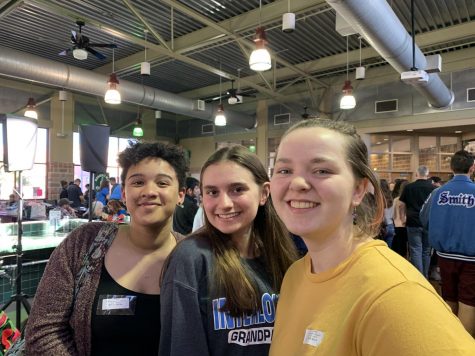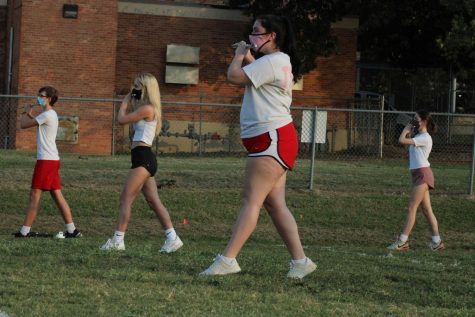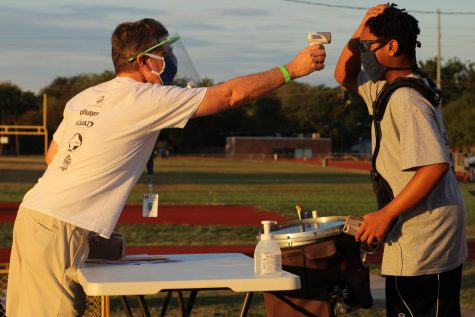Perseverance is key for Mac musicians
From camps to contests to socially distanced practices, music programs find ways to make it work during quarantine
October 23, 2020
In pre-pandemic times, one stroll through the McCallum Fine Arts Building could tell you just how much McCallum students love to make music. Music of all kinds poured from the doors and windows: voices sang in harmony, violins tuned up the orchestra and drums kept the beat for the band. Now that a global pandemic has shut down McCallum and other schools across the country, McCallum music students have taken matters into their own hands.
This fall, the musical events at the forefront of the Mac musicians’ minds are the statewide contests hosted by the Texas Music Educators’ Association, or TMEA. Each year, TMEA holds competitions that progress from regional all the way to statewide in each musical discipline, including orchestra, choir and band. Usually the progressive contests are hosted by high schools in the area. Musicians trek to the host high school early one Saturday morning and do their audition in a classroom to a curtain that hides a panel of judges.

This year, the format will be revised to work virtually. TMEA announced on July 1 that all TMEA auditions through Jan. 10 will be conducted through recording uploads by students in order “to support excellence in student musical development and promote health and safety,” as it reads on the TMEA website. The TMEA region auditions took place from Oct. 10-14 and results were released on Monday.
For a McCallum music student participating in TMEA auditions, a typical summer includes a TMEA camp in which the audition material is learned and workshopped. This year, many music teachers are taking matters into their own hands. Orchestra associate director Erika Elder spent part of her summer helping her students learn their etudes for the auditions. Senior Ari Miller-Fortman said that this is not what happens in a traditional year, but Elder figured they could use some extra help.
“Many of us have been meeting online via Zoom with Ms. Elder to prepare for region/state auditions,” Miller-Fortman said. “We all printed out the etudes and have been learning them with her on Zoom. Normally we would use the summer to learn these etudes by ourselves, but this year, under the circumstances, Elder has offered her help knowing that she may not be able to help us in-person for the next many weeks.”
Miller-Fortman is intimidated at the prospect of a new audition format during a pandemic year, but she’s staying positive.
“[The format this year is] absolutely different and somewhat terrifying,” Miller-Fortman said. “I’m hoping that it won’t make too much of a difference on our auditions, but there’s really no way to know. I’m doing my best to have a positive outlook on this new format of auditions.”
Voice teacher Angela Irving, who works with many McCallum choir students, hosted virtual TMEA “camplettes” over Zoom in mid-july. She taught three one-and-a-half hour sessions for each voice part and covered all 9 songs that each voice part needs to prepare for this year’s auditions. Irving said there are some upsides to online TMEA camps.
“The great thing about doing everything online is there’s no travel time and parents don’t have to take time out of their work day to cart their students anywhere,” Irving said. “But, all the same, it sure will be nice when we can all sing in the same singer-packed room without worrying about infecting each other. Someday soon, hopefully.”
Irving also said that besides focusing on TMEA auditions, she has been teaching voice lessons over Zoom since the pandemic hit Austin, and that this period is good for trying new things.
“There have been obvious issues brought on by the pandemic when considering how to keep music-making alive, but, at the same time, it’s been an exciting time for innovation,” Irving said. “Right when schools were shut down, I immediately pivoted to teaching voice lessons via Zoom, and with some creativity, that has been working well!”
Junior Griffin Rans is a choir student participating in the TMEA process and he attended Irving’s camplettes. Rans explained that there are upsides to practicing and performing music at home, like the freedom he has to take risks that he normally wouldn’t take.
“I think that when we’re at home, we can actually experiment with way more things that we would be nervous experimenting with in front of people,” Rans said. “Whenever I’m in an audition and stuff I try to just stick to what I was told by my voice teacher because I’m scared I might overdo it or something. But I think with this whole online school thing, it gives us a chance to go over what we’ve done and give it a little pizazz.”
Senior percussionist Julian Smith agrees that he has been granted some flexibility and creativity within his own practice space. “As a percussionist it’s a little different because we don’t have access to all the instruments we usually would have,” Smith said. “It’s definitely not as engaging as it would be in person, but I’m harnessing more skills as a soloist, rather than playing in a group setting.”

The McCallum band held their first marching band rehearsal on Monday, Oct. 12, and safety protocols were put in place such as masks, temperature checks, and six feet distance markers. Although the competitive marching season was canceled due to COVID-19, the marching band anticipates playing at football games against Navarro and Crockett with approved PPE, including instrument bell covers and specially-designed masks.
Senior band student Fiona Wyrtzen has faced a unique challenge in preparing for the TMEA auditions this year: she came down with COVID-19 this summer. Wyrtzen plays the clarinet, a wind instrument, so she was unable to practice while she was recovering.
“I had [the coronavirus] in June, and it’s still harder to play a little bit,” Wyrtzen said. “For me it was very up and down. There was a point when I felt completely better, and I got back to practicing, and I told my teachers, like, ‘Oh, I’m ready, I can play in class now, and I can go back to doing my lessons.’ And I sort of went back down, so it’s really hard to say, like, ‘Well, I don’t feel good again,’ but all the teachers were supportive, of course.”
Wyrtzen foresees some issues with the virtual TMEA format, but she emphasized that every music student in the contest is going through the same things she is.
“I have to spend hours and hours trying to get a good recording,” Wyrtzen said. “Regularly, you just go in… you get the adrenaline of the moment, and you get it over with. I will miss that… I think a lot of us are in the same boat, with choir and everything. It’s so sad, but we’re making it work.”
–with reporting by Madelynn Niles



